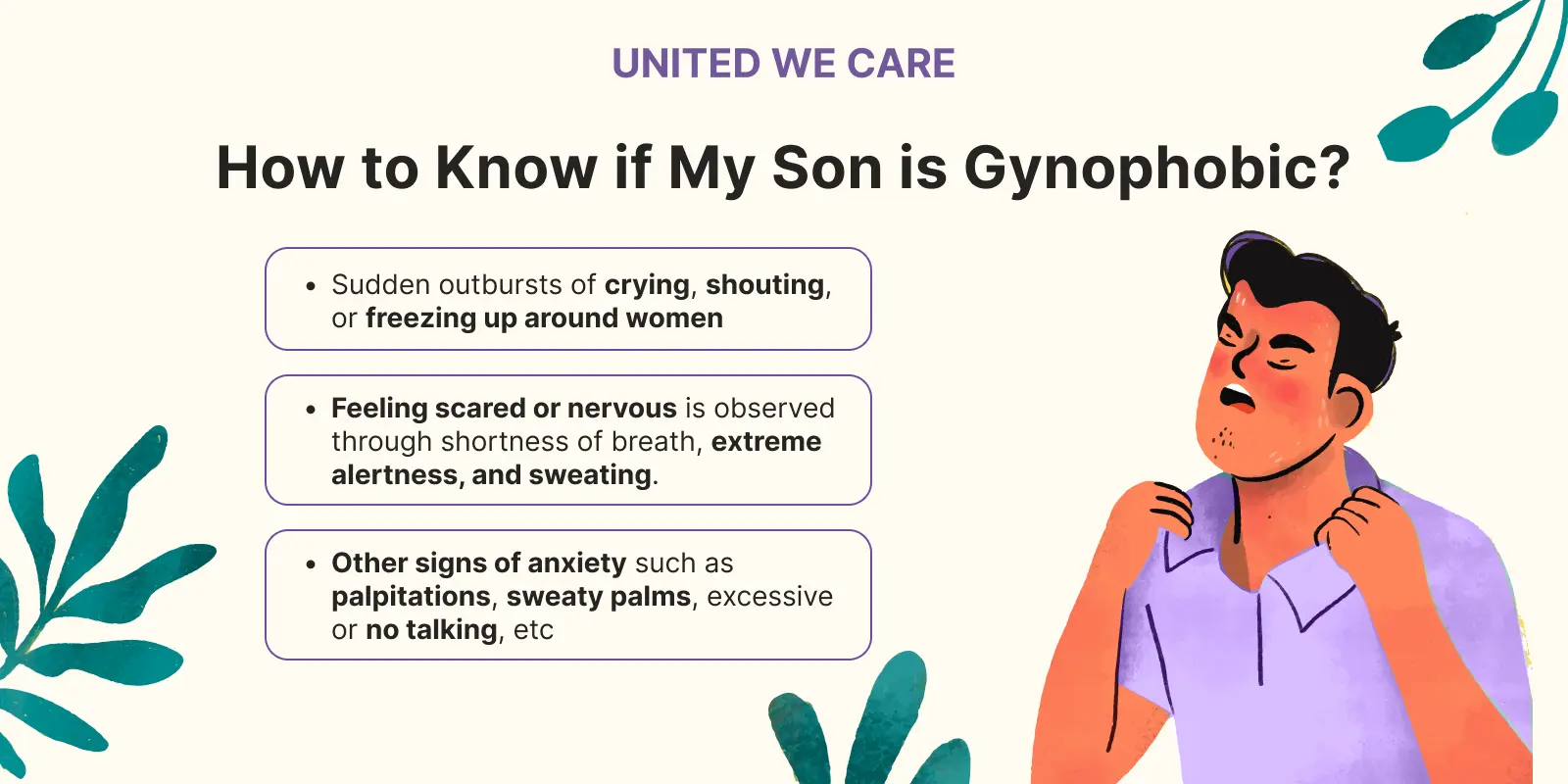Introduction
When we’re under a threat, we feel fearful. This fear helps us kick in our fight or flight response to the threat. Hence, it helps us protect ourselves from danger. However, sometimes, this fear could be way out of proportion, even without the presence of an actual threat or danger. When our fear becomes excessive and irrational, it turns into a phobia. Phobias are classified as an anxiety disorder within the Diagnostic and Statistical Manual of Mental Disorders (DSM-5). This condition usually leads to a lot of distress and physical symptoms of panic and can cause severe impairment in the way we function in our day-to-day lives.[1] Some of the most common things people are phobic of are spiders, heights, enclosed spaces, injections, etc. In this blog, we’ll dig deeper into androphobia, which is the intense fear of men.
What is androphobia?
In Greek, “Andros” means man, and “Phobos” means dread. Hence, as per the term popularized during the lesbian-feminist movements, androphobia is the intense fear of men.
Being apprehensive or uncomfortable around men you don’t know is quite normal. But androphobia takes it to an extreme. You might be severely distressed in the presence of any men and would go to huge lengths to avoid any interaction with them. Your logical thinking may go out the window, and you may be resistant to reassurances from them. This can really hinder how you function in your daily life.
Symptoms of androphobia
It is important to understand the symptoms of androphobia as it can greatly affect your personal, professional, and social life. Symptoms you can look out for are:
Psychological symptoms:
- You dread even the thought of interacting with men.
- You experience overwhelming anxiety and even panic attacks in the presence of men.
- You go to great lengths to avoid interacting with men and, in the process, keep yourself from social situations and professional opportunities.
- Because of how much you fear being around men, you’re always on the lookout for men in your surroundings, which makes you hypervigilant.
Physical symptoms:
- You experience physical symptoms such as trembling, increased heart rate, sweating, shortness of breath, dizziness, and stomach distress when you have to interact with men.[2]
- Additionally, you may also experience nausea, hot or cold flashes, numbness or tingling sensations, chest pain, and dry mouth.
Cognitive symptoms:
- You understand that your fear is not rational, but you feel helpless in front of it.
- You have trouble focusing on whatever you’re supposed to be doing because of how much you’re preoccupied with wanting to avoid men.
- Your decision-making process is clouded, so it leads to poor judgment in any situation involving men.
Behavioral symptoms:
- You have an intense desire to escape any situation involving men.
- You constantly need reassurance that you’re going to be okay when you’re in a public place with men.
- Stories revolving around men make you anxious, so you’ve started avoiding movies, books, or news that involve them.
Long-term symptoms:
- You have low self-worth.
- You have restricted yourself so much so that you have limited personal and professional relationships.
Causes of androphobia
While there is no single known cause for androphobia, there are several factors that can increase your chances of developing it, such as:
- Having a traumatic personal experience with men: You could have experienced this in the form of a major incident of harm or abuse from a male figure or repeated negative experiences such as harassment or emotional abuse. Going through something like this can create a strong association between men and fear.
- Your genetics: If anxiety disorders, including phobias, run in your family, you are more likely to develop them, too.
- Your environment while growing up: You have a parent, sibling, or close relative who is fearful and cautious of men. As a child, you learned from this behavior and started imitating their anxious responses and might eventually develop the same fear, too.
- The way your brain is wired: Abnormalities in the functioning or structure of the amygdala and the hippocampus regions of your brain can cause you to have exaggerated fear responses and, hence, phobias.
- Societal factors: If you live in a patriarchal society and experience oppression, discrimination, and violence caused by men, you may develop a generalized fear of men and, in some cases, a phobia of men.
A combination of these factors [3] can lead to the development of androphobia.
How to get rid of androphobia
If you have androphobia, it is important to seek treatment to improve your quality of well-being and life. Some ways to get rid of this phobia are:

- Cognitive behavioral therapy (CBT): A psychotherapist can help you identify and challenge your irrational fears and restructure your perspectives and thought patterns to something more realistic that serves you better.
- Exposure therapy: In this therapy, you will be exposed to your fears (i.e., men) gradually in a safe, clinically controlled setting. The idea is that you’ll be able to desensitize your fear of them and reduce your phobic reaction to being around them over time.
In conjunction with therapy, your doctor may also prescribe you anti-anxiety medication to treat your physical symptoms. Ultimately, creating awareness about your fears, what triggers you, and how you respond in a setting with men is key to learning to manage the condition.
Conclusion
Phobias are a type of anxiety disorder that can disrupt your well-being if left untreated. Androphobia is an intense, irrational fear of men. If you have this phobia, you may dread even the thought of engaging with men and even have physical symptoms such as trembling or dizziness when you have to interact with them. You may have developed this phobia due to a combination of factors such as your first-hand traumatic experiences with men, your genetics and environment, your brain functioning, and the kind of society you live in. Psychotherapies such as cognitive restructuring and exposure therapy have been proven the most effective in the treatment of phobias. At United We Care, we offer the most appropriate, clinically backed solutions for all your needs for well-being. If you wish to seek help for your anxiety and fears, book a session with one of our mental health experts today.
References:
[1] American Psychological Association, “Phobia,” in APA Dictionary of Psychology. [Online]. Available: https://dictionary.apa.org/phobia. Accessed on: Nov. 7, 2023
[2] NHS, “Symptoms – Phobias,” NHS UK. [Online]. Available: https://www.nhs.uk/mental-health/conditions/phobias/symptoms/. Accessed on: Nov. 7, 2023
[3] Isaac M. Marks, “Fears and Phobias,” 1999. [Online]. Available: https://books.google.co.in/books?id=I8lGBQAAQBAJ. Accessed on: Nov. 7, 2023





